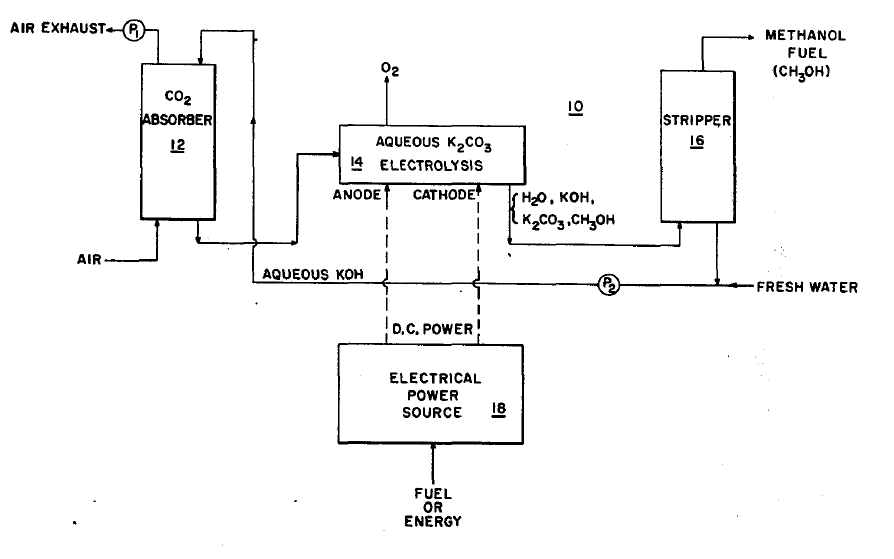
Methanol economy vision
We now live in a carbon economy, thanks to devestating oil and gas production and an understanding with the oil producing countries (that would rather keep some oil for themselves). But before that we have had a coal based economy, and before that a wood based economy. How to cook, cast iron, heat without wood if there is no coal. Slavery is another economy, because slaves can be given fixed caloric rations and be excluded from economic exchanges, and if they grow more crops than they consume you have a free source of calories, labour, productive power to generate wealth.
An economy becomes based on something if that something is the primary factor in production of goods and services.
For our future based on renewables several ‘economies’ have been proposed, based on different fuels that are somewhat compatible with our present fuels.
A wind-turbine NH3 facility would essentially lock in our energy cost
for the next 20 years. My very rough figures indicate an equivalent cost
of about $3.00/gallon for NH3 production (bron)
We have the Ammonia based economy, which means most internal combustion engines run on Ammonia (NH3) instead of fossil fuels. Especially diesel engines are very well suited, and need almost no conversion to become ammonia engines. Ammonia can be made with wind through a well understood process. Today Ammonia is made with methane, but before that it was made with hydroelectricity.

Ammonia fuel safety
The ammonia economy is hampered by rediculous fuel safety rules, namely that new fuels need to be 1000 times safer than the ones we already have. Ammonia is the safest fuel if used in cars, trucks etc. Another way it is hampered is by making it hard to get funding or investment. This is simply the banks protecting their primary cash cow, fossil fuels, becuase ammonia means independent production, storage, logistics of energy, meaning no ‘carboncredit’ needed.

The Hydrogen economy may some day take off, but it’s unlikely. Simply because if hydrogen is used to the fullest extent there is no problem in production based on renewables, and people don’t need to have an economy to get it, it won’t be scarce, you won’t need to work for it, you produce it locally and that’s it. It’s not the best solution for cars, batteries are much more efficient (35%). But it is unlikely our present society will see a conversion to all electric cars before some major carbon economic calamity. To speed things up we would need to push wheel hub electric motors so a bigger part of the fleet can convert and possibly use hydrogen fuel cells. For heavy industry there are easier more energy dense synthetic fuel options.

Early biofuel crops
The Ethanol economy is quite old. Brazil has had it for decades, growing sugar cane, turning it into alcohol and mixing that in the fuels for cars and trucks etc. It’s a biofuel, and it is unclear how efficient it is. Maybe we can group it with all Biofuels, unsaturated or saturated plant fats and oils, with the exception of maritime or pond grown algae and seaweed. The trouble with biofuels and ethanol is that it depends on agriculture, and that depends on massive fertilizer production, diesel logistics, chemical imputs which still depends on carbon supplies (with the exception maybe of sugar cane, have to look into how that worked).
The Methanol economy is an interesting one. It is patented! Methanol can be synthesized with electricity like ammonia. It has some nasty properties in that it is corrosive and poisonous to humans. But that means you can make more money managing and securing it, which creates an appeal to common economic thinkers. Ethanol/Methanol mixes are now touted as being suitable for all engines, which they where for some time. The two factors are corrosion and ignition, engines may not be made of materials that can stand the corrosion, and the ignition system needs to be programmed to deal with the specific flash point of the fuel (which for a long time was slowed down in gasoline using lead).

Making methanol with electricity.
The Synthetic Methane economy is another possibility, but holds the risk of inviting the gas economomy, fracking, clathrate gas and resulting complete ecological anihilation. But Methane can be made with solar power, by splitting water and mixing the H with CO. You end up with a hydrocarbon gas to which a lot of our world is already adapted. One of the countries trying it is Quatar. One cathalist is nickel, but that is unpatentable. If you have hydrogen you can make the methane easy, and if you have methane an number of other chemicals come within reach, silmilar to ethanol/methanol.

A way to make methane directly with sunlight. It’s easy once you have H2 and CO2
Conclusion
The above economies need space to grow into. The currently dominant carbon economy will crash at some point, namely when industry and banks have rallied enough right wing numbskulls to prevent our proper response to poverty and chaos. The better scenario for industry is war. We are now seeing poverty grow but we are all still to much hooked up to a few media sources to see our reality and grasp the trend. Once we do we must hope to still be able to do something about it. Then we may develop all of these options and more, so a mixed opportunistic economy, and hopefully noone will be strong enough to push out any other ever again.Then as renewables take over the role of primary source of wealth we will be able to use all this energy to restore what we now allow fossil fuels to destroy. We are smarter to start now though.